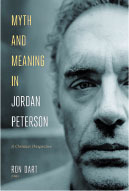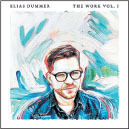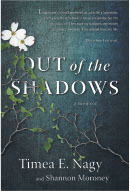Art by Anita Van Zeumeren; Evangelicals (Noll et al); Brave Women, Bold Moves (Ostapchuk); Myth & Meaning Jordan Peterson (Dart); My Inner Atheist (Rauser); The Work Vol.1 (Dummer); Out of the Shadows (Nagy, Moroney)
Extended review

Evangelicals: Who They Have Been, Are Now, and Could Be
Editors: Mark A. Noll, David W. Bebbington, George M. Marsden
Eerdmans, 2019. 288 pages. $39 (e-book $9.99)
H. L. MENCKEN, the American journalist and skeptic, infamously wrote in the 1920s, "Heave an egg out of a Pullman window, and you will hit a Fundamentalist almost anywhere in the United States today." The satirist was exaggerating, as usual, but he did so to drive home a point – the widespread visibility and influence of Fundamentalism in his time and place.
Today, an egg tossed from a VIA train on a cross-Canada journey may not hit an Evangelical, but their presence in the country can’t be denied. Polls suggest between 6 to 13 per cent of Canadians have some combination of beliefs, church aœliation and self-applied labels such as evangelical, Pentecostal or born-again Christian to warrant the term (see www.TheEFC.ca/2019CFT).
However, the presence of Evangelicals in the nation’s religious demography is no time for triumphalism (or, perhaps in our decade, Trumpalism), but humility and self-scrutiny. Surely it comes as no surprise the word evangelical itself is in trouble. Foremost are the very real questions in the subtitle of this book – Who have Evangelicals been in the past? Who are they in the present? Who could they be in the future? Thought-provoking inquiries three.
This new book aims to shine light on the paths or trajectories from the past in relation to current debates about evangelicalism. The contributors uniformly acknowledge the word evangelical comes from the New Testament term for gospel or good news. The Christian gospel is relevant to the contemporary world. This is the basic reason why historians of evangelicalism – indeed all Christians – should engage in healthy introspection. These and many other ideas are discussed in this book.
-- Advertisement --

The approach taken here reprints some classic scholarship on American evangelicalism since the 1920s and Britain since the 1830s, and adds some original chapters revolving around the overwhelming support former U.S. President Donald Trump received from Evangelicals.
Because evangelical is such a vague word, reactions to it are quite intense.
Trump roused his followers with the clarion call to Make America Great Again. Timothy Keller for one wonders if evangelicalism can survive Trump. Canadians would do well to learn from this cautionary tale. How do politics and religion interact? What are the dynamics at play between the two, between Caesar and Christ?
Mark Noll’s contribution to this book, "Evangelical Constituencies in North America and the World," is of keen interest to Canadians. He points to the secularity of issues of belief and practice in Canada. What does it mean to be a Canadian Christian in the 21st century? Evangelicalism may have arrived, however this word is understood, but at what price? How does it counterbalance trends in a diverse and secularized Canadian media, academia and government? Are Christian traditions, values and morality being edged out?
Noll doesn’t mention it, but evangelical involvement in groups such as the Canada Family Action Coalition, which encourages Canadian faith communities to proactively participate in politics and civil government, invites comparisons to the politicized elements of evangelicalism in the U.S.
Because evangelical is such a vague word, reactions to it are quite intense. To the question Am I an Evangelical? Canadian Pentecostal Brian Stiller responds Yes. "For myself," he writes, "I’m sticking with the term. Its biblical message still resonates. Its historical influence reminds me of Christ, the Good News. … The really great news is the Evangel, a faithful reminder that Jesus is ever present, himself the Good News."
The American Baptist Thomas Kidd, speaking for a sector of Evangelicals in the U.S., says, "I don’t want to be lumped in with an amorphous mass of white religious Republicans who share ethnicity and voting behavior but not biblical beliefs or the experience of conversion."
"Evangelical," Kidd continues, "has become fundamentally politicized and divisive." Further, "In public references to ourselves, it is probably time to put evangelical on the shelf." Kidd wonders if the term evangelicalism is redeemable in an increasingly secular world.
A key strength of this book is that it places Evangelicals within a historical context, helping readers to appreciate its rich if complicated history.
A key strength of this book is that it places Evangelicals within a historical context, helping readers to appreciate its rich if complicated history. The central pillars of evangelicalism are theological convictions, not political ones. In the same breath, throughout American history evangelicalism and politics have been closely linked.
Since this book was published, American professor Ryan Burge has used sociological data that measures how in popular culture the term evangelical is becoming more of a political than religious label (http://l.faithtoday.ca/Burge).
This is a crisis the editors of this book do not shy away from. According to the Apostle Paul, writing to the church at Philippi, change is possible. Far from being perfect, each of us is called to "press on toward the goal to win the prize for which God has called [us] heavenward in Christ Jesus" (Philippians 3:14).
Evangelicals is a welcome book, not to be relegated to a shelf of reference works to gather dust, but to be vigorously and intentionally interacted with. Readers will find much to agree with and, perhaps more so, debate. Discerning readers both within and beyond evangelicalism will ponder both the peril and promise of a largely misunderstood, multifaceted movement. Read Evangelicals, then prepare to join that conversation.
 Burton K. Janes is a freelance writer and editor in Bay Roberts, N.L. (www.BurtonKJanes.com).
Burton K. Janes is a freelance writer and editor in Bay Roberts, N.L. (www.BurtonKJanes.com).
Listen to our podcast with Mark Noll, to be released May 3, 2021 at www.FaithToday.ca/Podcasts.

Brave Women, Bold Moves: Choosing Courage in a Culture of Conformity
By Cathie Ostapchuk
Word Alive, 2019. 184 pages. $22 (e-book $9.99)
THE WORLD has always needed courageous women – yet most of us do not feel brave. As the depths of injustice and need are increasingly unveiled in our time, we can easily assume that God will choose someone else to bring change. But Cathie Ostapchuk, founder and leader of the Canadian movement Gather Women, challenges us to rethink that assumption.
With passion and vision she uses her latest book to help all women discover an honest and transformative courage that emerges from the very imperfections of our lives for the good of our world.
The book (www.BraveWomenBoldMoves.com) is laid out as a reflective journey inviting readers to connect with women of the past to bravely take up God’s invitation in the present.
With passion and vision Ostapchuk uses her latest book to help all women discover an honest and transformative courage.
Weaving stories of biblical women such as Leah, Jochebed, Ruth and Bathsheba together with stories of contemporary Canadian women, Ostapchuk illustrates a bravery that can spring up amid fear, shame and pride.
After each chapter a series of questions and prayers invite deeper reflection, making this a great book for small group study or personal retreat.
Ostapchuk’s passion is contagious and her vision is large. The call she issues is not only for women, but for the whole Church today and generations to come. God has always invited women to be leaders and catalysts in His story, but the path has not always been easy.
Amid struggle and the pressure to conform, this book will pull you to your feet and fan your courage into flame. –JULIA BOWERING

Myth and Meaning in Jordan Peterson: A Christian Perspective
Edited by Ron Dart
Lexham Press, 2020. 248 pages. $23 (e-book $9.99)
JORDAN PETERSON is a Toronto professor who has left an indelible mark on the minds and lives of a generation grappling with questions of truth and meaning. While controversial his work has such international popularity that it’s worth a careful evaluation – exactly what this book does.
Editor Ron Dart is a Toronto-born associate professor of political science at the University of the Fraser Valley who has published 40 books. In this new anthology he marshalls a multidisciplinary evaluation of Peterson by a variety of scholars, each elegantly applying their specialized expertise.
The chapter on Kierkegaard is particularly helpful, educating the reader as much on Kierkegaard as it does Peterson. Contributor Stephen M. Dunning observes that "Where Kierkegaard is optimistic about reality and pessimistic about the self, Peterson is pessimistic about reality and optimistic about the self. And this provides a key to the limitations of Peterson’s position."
While the book does skew toward an appreciative stance on Peterson, it also lands some firm critiques of him and points readers to substantial additional Christian scholarship.
The quality of writing from these Canadian authors is excellent, but the length of the book means they can’t visit Peterson’s work in detail. The book sadly lacks scholars trained in psychology and intersectionality, but that’s understandable given the book’s focus on why Peterson is connecting with people (rather than on his own academic field).
This book is best suited for Christians in education or pastors who want to know more about Peterson as they engage with congregants who are reading him. –JESSE KANE

Conversations With My Inner Atheist: A Christian Apologist Explores Questions That Keep People Up at Night
By Randal D. Rauser
2 Cup Press, 2020. 202 pages. $16 (e-book $5.99)
ALBERTA THEOLOGIAN Randal Rauser has long had an interest in atheism having written a number of books on the topic. But not all atheists are out there. Some are closer than we like to admit.
In his new book Rauser literally has a conversation with his inner atheist, whom he affectionately calls Mia (My Inner Atheist). Mia is that little voice that wakes up to remind us faith is not as simple as we’d like.
Mia keeps bringing up the difficult topics that are not often openly discussed among Christians. Responding with "Just have faith" only goes so far.
Rauser responds to each of Mia’s arguments as to why Christianity does not make sense, demonstrating that Christianity is both coherent and compelling, even when it can also be messy.
If there is a weakness to this book, it is that it at times feels less like a conversation with that inner voice and more like a debate with an online atheist. With Rauser’s active online presence in responding to atheists, that is to be expected.
The most significant aspect of the book is not the arguments Rauser puts forth, but the admission that we all have an inner atheist. We may be confident in some things, but there are always hard questions we struggle with.
This is not a book aimed at convincing skeptics, but it opens space for Christians to ask difficult questions and provides some tentative answers. –STEPHEN J. BEDARD
Canadian creatives

"Canada’s final report on missing and murdered Indigenous women and girls stated that the disproportionate level of violence against Indigenous women was genocide that originated from colonial ideologies and policies such as the Indian Act. The background of this painting is a collage of the first Indian Act of 1876. The woman represents the countless women who, because of this racist, gender-biased legislation, lost their identity, their culture and often their lives. Despite the brutality of this legislation, it cannot destroy the strength and resilience (as represented by the roots) of Indigenous women. They will endure. The red handprint is a symbol of missing and murdered Indigenous women and girls. After dipping my white hand in red paint, I must ask myself, ‘How do I recognize and take responsibility for my part in this country’s colonization?’"
Legislated to Death (oil, mixed media, cold wax, on 36 X 36 cradled wood panel) by Anita Van Zeumeren www.Instagram.com/AnitaVanZeumerenArtist
Music

The Work Vol. 1
By Elias Dummer
Integrity Hosanna, 2019. $15.99 (vinyl $20, streaming on Apple, Spotify and Amazon)
WORSHIP LEADER Elias Dummer is the founder and former frontman for The City Harmonic, a Juno- and Covenant Award-winning band from Ontario. When the group disbanded in 2017, Dummer moved to Nashville to pursue a solo career. The Work Vol. 1 is his debut solo offering.
A highlight of this diverse, colourful album is Elias’ rich, country-tinged voice. He can move with ease from energetic worship anthems ("As a Saint," "What Are We Waiting For") to poignant ballads ("Heartbeat," "Free").
This is not a typical worship album, but has a more intimate, singer-songwriter vibe. It feels like we are listening in on the singer’s deepest, personal thoughts on his faith journey. Even the short and sweet "Do Not Be Afraid" feels like it could have been written as a lullaby for the singer’s five young children.
The standout track is the single "Enough," a passionate reminder that our identity is found in Christ and not in our own endeavours. With a powerful, singable chorus, this one is sure to become a congregational favourite.
The title track "The Work (It Ain’t Easy)" sums up the struggle of every disciple of Christ. "I am not made righteous by the sweat upon my brow. / I am not made holy with a vote. / And the work of my salvation is to die up on a hill / with Jesus and two thieves I hardly know."
What separates this project from so many contemporary worship albums is the profound depth in the lyrical content. Elias’ songs burst with honest emotion and energy, and are also rich in theological truths, soaked in gentle reverence and humility. –ALI MATTHEWS
Reading the bestsellers

Out of the Shadows: A Memoir
By Timea Nagy and Shannon Moroney
Doubleday Canada, 2019. 368 pages. $25 (e-book $14, audiobook $29)
THIS IS THE compelling story of one woman’s journey through the terrors of human trafficking to the rewards of advocacy. Timea Nagy was a desperate and naïve 20-year-old when she left Hungary for what she believed would be a well-paying babysitting contract in Canada. But within 24 hours she realized she had been deceived, corralled into the abusive underworld of exotic dancing and prostitution.
Starved, assaulted, sleep deprived and isolated by cultural and language barriers, she was forced to work 20-hour days to pay off fabricated debts to her "agents," who she too late understood were exploiting her. Nagy’s memoir of that dark season and her harrowing escape is raw and gritty, but also brave and transparent, seeded with remarkable moments of kindness and hope.
North Americans often think of human trafficking as a social issue "over there" – in Asia, Europe or Africa. Nagy’s testimony proves us wrong. Her story plays out right on our doorstep in suburban Toronto.
In the past decade there have been almost 2,000 police-reported incidents of human trafficking in Canadian cities. Nagy points out whereas migrants were the primary victims of this organized crime 20 years ago, today it increasingly victimizes young Canadian women.
Christians who know God’s call "to loose the bonds of wickedness" and "to let the oppressed go free" (Isaiah 58:6) can learn from this book, and then seek to partner with God in His redemptive purposes. –EVELYN PEDERSEN
Editor's note: Faith Today earns a small commission when people make purchases using our links to Amazon.ca.